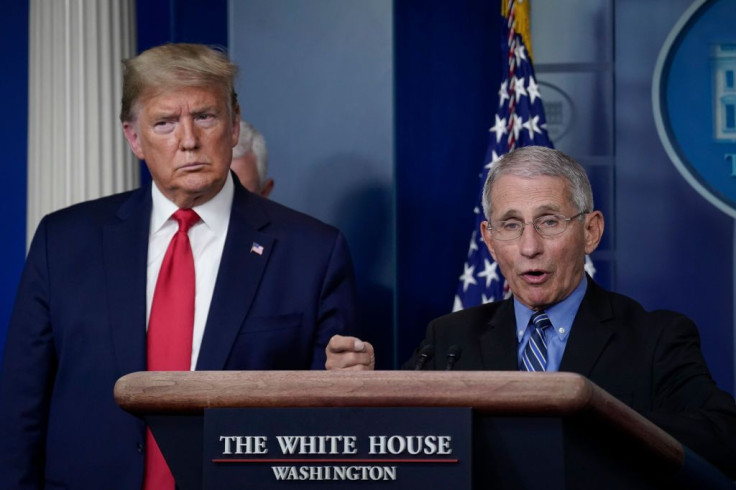Trump Approval Rating Hits All-time High Amid Coronavirus USA Outbreak

KEY POINTS
- Trump's approval rating grows to 49% despite his criticized missteps in the COVID-19 crisis
- Trump received a 60% approval rating for his handling of the COVID-19 crisis
- A "presidential approval rally effect" seems to be the cause of this uptick
Previous U.S. presidents faced by a national crisis, however unpopular they’ve been, have seen their approval ratings rise as Americans rallied behind their leadership. President Donald Trump hasn't been exempt from this historical fact, and saw his most recent approval rating move-up due to the COVID-19 pandemic sweeping the country despite his widely criticized handling of this crisis.
A new Gallup poll from March 13 to 22 shows 49% of U.S. adults approve of the job Trump is doing as president compared to 44% in the earlier poll taken from March 2 to 13. Trump also saw a 49% job approval ratings in late January and early February around the time of the Senate impeachment trial that resulted in his acquittal.
The 49% approval is the highest of Trump’s presidency, according to Gallup. It's another high mark for Trump since he came into office. He first hit that mark in late January, shortly before he was acquitted by the Senate in his impeachment trial.
Surprisingly, more Independents and Democrats gave their nod to Trump's performance. The poll shows 43% support Trump in the new poll, up 8% from the previous poll. Six percent more Democrats approve of Trump this time around, taking his approval rating among Dems to 13%. Trump's approval rating among the GOP rose one percent to 92%.
As for his handling of the COVID-19 crisis, Trump received a 60% approval rating and a 38% disapproval rating. Gallup shows 94% of Republicans, 60% of independents and 27% of Democrats approve of his response to COVID-19.
Gallup's analysis of the poll suggests a "presidential approval rally effect" might be the cause of Trump's rise in popularity. Gallup pointed out that historically, presidential job approval has increased when the country is faced by a national threat. Every president from Franklin Roosevelt (World War 2) through George W. Bush (9/11) saw their approval rating rocket at least 10 points after a significant national event of this kind.
Bush's 35-point increase after 9/11 is the most notable rally effect on record, said Gallup. The polling firm noted two aspects of Trump's approval rating from March 13 to 22 suggest the effects of the presidential approval rally effect.
One aspect is Trump's rating shows a sudden increase, and this increase is seen among both independents and Democrats -- both highly unusual for Trump in particular.
Another is presidential job approval has historically increased when America faces a grave national threat, and the gut reaction of Americans is to rally around the commander-in-chief. During these rallies around the president, independents and supporters of the opposing party to the president typically show more support for the commander-in-chief.
Gallup also pointed out presidential approval ratings today are marked by consistent and quite low approval ratings from opponents of the president's party.
"As a result, neither Barack Obama nor Trump saw rally effects as big as those of their predecessors, because their usual opponents were reluctant to approve of them regardless of what was happening in the country," Gallup noted.
© Copyright IBTimes 2024. All rights reserved.





















